Shakespeare: The Animated Tales (1992)
Originally posted on 14 December 2024First episode title: A Midsummer Night's Dream
How familiar with the show am I?: I didn't recognise it from the title of the series, but I have actually seen this particular episode before, in school!
By complete coincidence, we have two shows in a row that are a completely different story each episode, but this one is a lot more specific. Yes, it's a series based entirely on Shakespeare plays. I hadn't known that the animated adaptation of A Midsummer Night's Dream they showed us in school was part of a TV series, but now I've re-discovered it after all these years!
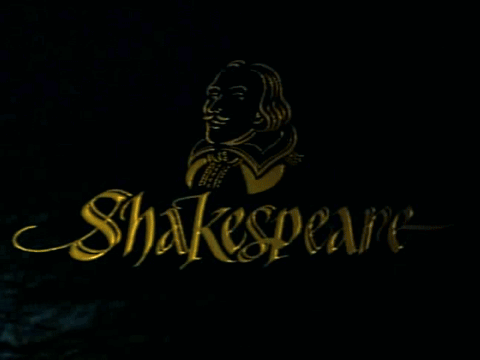
Adapting an entire five-act play into a half-hour animated show requires some compression, of course, so the show starts with a mildly patronising narrator quickly giving us all the exposition that takes Shakespeare most of the first act to deliver. Yes, it's a major violation of "Show, don't tell", but I don't see that they had any other choice. And I guess the format of this blog means it's now my job to abridge the explanation even further, so if you're ready: we're in ancient Athens in the days leading up to the wedding of Duke Theseus and Hippolyta. Lysander and Hermia are in love with each other. Helena is in love with Demetrius, but Demetrius instead loves Hermia. And Hermia's father, Egeus, wants her to marry Demetrius, and the law of Athens forbids her from disobeying her father's wishes. All of this is portrayed quite literally while it's being narrated, with Egeus himself putting Hermia's hand in Demetrius's.
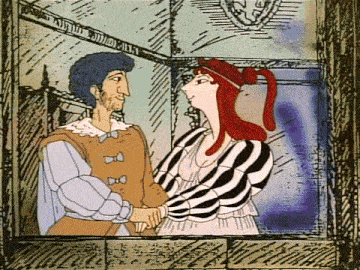
The costumes here are interesting - they look like they're more from Shakespeare's time than the ancient world, except for Demetrius's toga-like outfit, spoiled by the Tudor-era ruff around his neck.
The narration continues (and I promise it does switch to mostly character dialogue eventually), as Lysander and Hermia sneak out at night to some woods to try and escape Athens to somewhere that its laws couldn't touch them. But Hermia has told her best friend Helena what she is planning, and Helena, hoping for praise, tells Demetrius, who heads off to the woods to kill Lysander, with Helena in pursuit. Got all that? I wish the two women didn't have such similar names... I also love how Demetrius, who's topless when Helena comes to see him, pulls up his top and ruff out of nowhere like some kind of superhero transformation as he sets off.
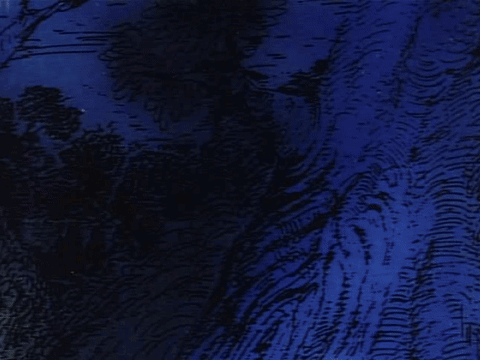
Next we're introduced to another group of people that happen to have snuck out to the same woods that same night. Six men are preparing to put on a play at the wedding, and they've come to practise in secret. For anyone unaware, women weren't allowed on stage in Shakespeare's time, so any play would be put on by an entirely male cast, with the younger men most often taking the female roles. The play they're preparing to put on is Pyramus and Thisbe, a tragedy about two lovers from rival houses forbidden from seeing each other. If this sounds familiar, yes, Romeo and Juliet takes some of its inspiration from the much older story of Pyramus and Thisbe.
The two men of this group we need to care about most are Peter Quince, who is going to direct the play, and Nick Bottom, who is to play Pyramus. The narrator claims that Bottom is a great man who could play any role, but I can only assume that we're meant to take this as sarcasm, as he hams it up at every opportunity. In his first scene, he keeps trying to get extra roles, first asking if he can also play Thisbe somehow, and then asking if he can also play the lion. He demonstrates his roar. It's bad.
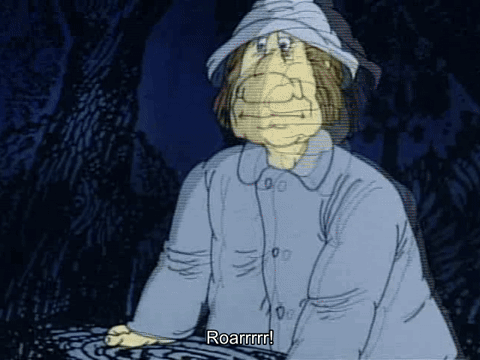
And now, if you've heard anything about A Midsummer Night's Dream, you probably know about the fairies. The fairy king Oberon and his queen Titania are also in the same woods that night, each accompanied by an assortment of strange-looking beings. I really like the varied designs of the fairies, and their colour schemes and designs shift depending on their mood or actions. Oberon is accompanied by his henchman Puck, and we'll come back to him, oh yes we will. The two royals aren't speaking to each other at the moment - the argument is over a changeling boy who Oberon wants to raise as his new servant, but the boy's mother was a devotee of Titania, and so she insists on keeping him. In the original play, the boy is said to be from India, and even though that fact isn't mentioned here, the character designers must have had that fact as reference, as he's portrayed wearing a turban. Oh, and by "changeling" they're referring to the idea of the fae taking a human child and replacing them with one of their own, so presumably there's a fairy growing up in India right now.
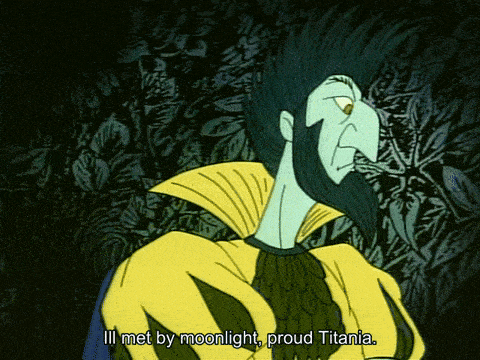
After Titania leaves with her fairies and the boy, the narrator explains that a quarrel between elemental forces like the fairies can cause a discord in nature, which is represented by a quite surreal animation involving fish with two faces spitting out suns that turn into snowflakes. I don't think us mere mortals are capable of understanding. Oberon sends Puck flying off to find a particular purple flower - one that contains a juice which, if it touches the eyes of a sleeping person, that person will fall in love with the first living being they see on waking. We're shown an example of a small insect falling in love with a much bigger horned bug that you would not expect to be a good match for it, to demonstrate the chaos it can cause. Obviously we're going to see it get used a few times, but I'll say straight away that no, no-one takes the opportunity to make anyone gay with the love juice. What a waste.
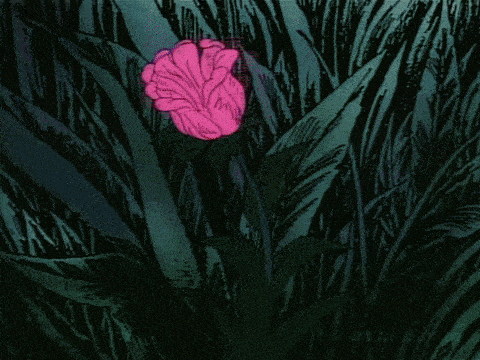
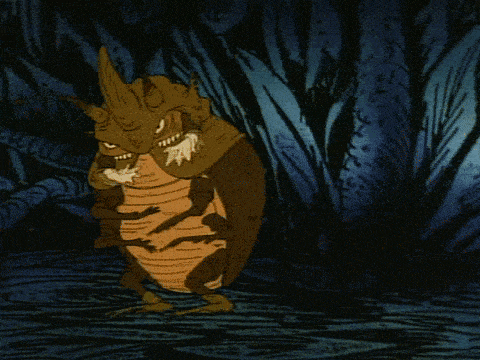
Oberon does this thing where he becomes "invisible" by turning into the form of plants and blending into the background, which a few of the fairies do throughout. He's doing it right now because people are approaching - specifically, Demetrius and Helena. Demetrius is telling Helena to stop following him, while Helena calls herself his "spaniel", and goes on about how he should love her. This is clear harrassment regardless of the fact that Demetrius has come to this forest to kill someone, but anyway, as they leave, Oberon decides he needs to get those two to fall in love, seemingly not for any nefarious plot but just because he can't stand to see someone get rejected. Maybe it's just reminding him of his own marital issues.
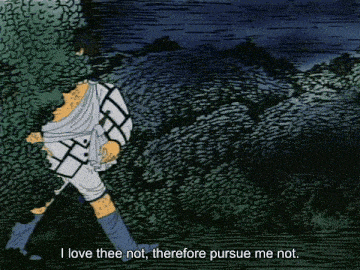
This is when Puck comes back with the flower, so let's talk about him now:
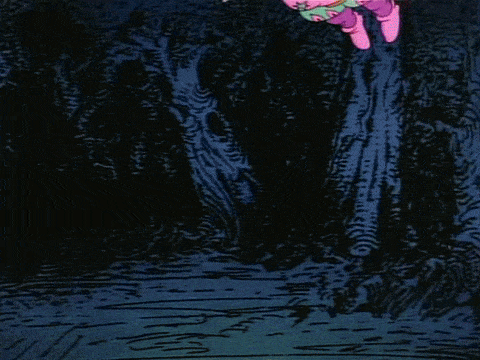
Look at him. Look at this man. That is an amazing look. It's like someone didn't have a rave outfit so they dyed their Shakespearean get-up from their amateur dramatics club in neon pink and cyan colours. He's so distinctive that he's the only reason I was certain I'd seen this episode before, because who could forget that design? If anyone knew about this show, people would be cosplaying as him.
Oberon explains that he's planning to use the flower on Titania to mess with her, but he gives one petal of it to Puck to use on Demetrius. He tells Puck to look for the Athenian man and woman who are together in the woods, and to use it on the man. This is a Shakespearean comedy - even if you don't know this specific one, I'm sure you can tell some amount of where this is going.
Speaking of Titania, she's lying down to go to sleep, and asks her fairies (and the changeling) to sing for her. The song is one that tells all the creatures of the forest not to disturb her sleep, and this show's rendition of it will be stuck in my head for a while. But of course, there is something lurking in the forest to mess with her sleep, and once she's unconscious, Oberon approaches with the flower, dripping the juice in her eye and wishing that she will wake to see something horrible.
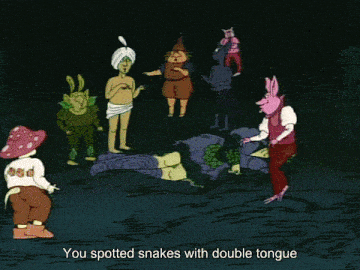
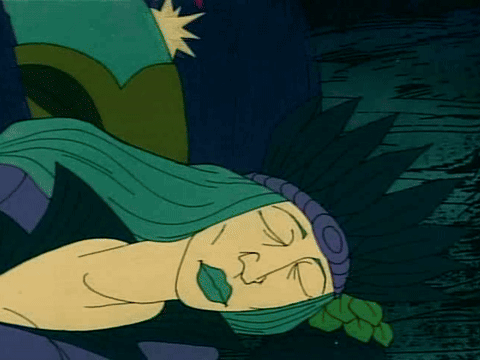
The sleeping bodies of Titania and her followers magically become invisible as Lysander and Hermia approach. That's not me being sarcastic about an animation error or anything - there is clearly magic involved. The loving couple have decided they need to find a spot to rest for now, and Lysander wants to rest together with Hermia. His tone makes his meaning clear, and Hermia thinks it more "virtuous" for the two of them to sleep apart. In other words, she's waiting until marriage.
Then Puck arrives, and of course, what he sees is a man and a woman in Athenian attire, sleeping separately from each other - as far as he's concerned, exactly who he was looking for, so he puts some of the juice in Lysander's eye and flies off, unaware of his mistake. Then Helena, trying to keep up with Demetrius, shows up, and discovers Lysander. Remember, Demetrius came here to kill him, so Helena isn't sure whether Lysander is dead or just sleeping - she wakes him up, and so she's the first thing he sees! He immediately starts professing his love, and Helena, offended, storms off. It's funny that Puck is known for his mischievousness to the point where the word "puckish" derives from his name, and yet one of his main contributions to the chaos of the play was completely by accident!
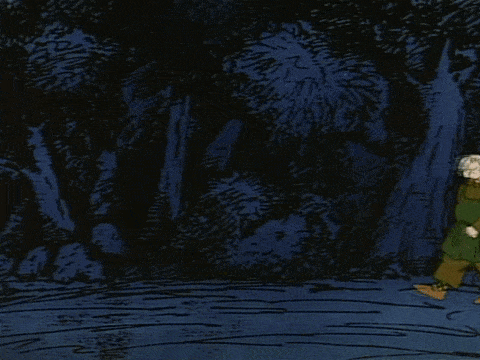
Back to the actors, who have found a nice place in the woods to practise. Quince hands out their roles as the narrator tells us who will be who - there's a funny bit where the narrator says that Flute will be playing Thisbe, Flute complains that he doesn't want to play a woman because he's starting to grow a beard, and the narrator insistently repeats that Flute will be playing Thisbe, as if she's part of the conversation! As well as Bottom being Pyramus, Snug will be the lion, Snout will be the wall - yes, they're running out of roles - and Starveling will be the moon. Starveling's face in this show is already quite crescent moon shaped, and when he's told that he'll be the moon, he somehow makes his eyes into moons as well!
They all start practising, which is mostly represented by them doing weird stretches and movements around the place while muttering some of the lines. At one point, Flute, who has clearly never done any voice training, recites some lines as Thisbe, and Quince complains about his performance. Unbeknownst to them, Puck is watching the performance from amongst the trees. Puck refers to the group as "hempen home-spuns", which is a line from the play, but what he doesn't call them in this show is "rude mechanicals", which is a more famous line in the play - scholars of Shakespeare often refer to this group of actors as "the mechanicals" because of that one line, so it's odd to leave it out. Both terms are ways of calling them uneducated working men.
Anyway, while Bottom is waiting for his cue to enter, Puck performs his actual mischievous act of the play - turning Bottom's head into that of a donkey. If you didn't know that that's how this play goes... well, now you do. Bottom steps out to say his lines, and everyone flees at the sight of his appearance. This episode perfectly portrays Bottom's own obliviousness at what has happened to him - he tucks his brand new tail into his pocket even as he wonders why everyone is running away from him, and at other points he touches his own face without noticing its changed shape.
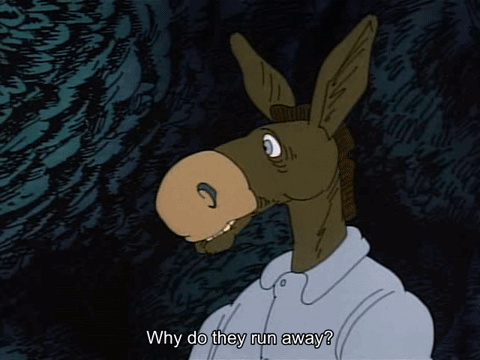
Bottom thinks everyone has fled to try and scare him - or to "make an ass of me", and yes, that pun is there in the original play. He starts singing to prove he isn't scared, a rambling song about various birds, and he's oblivious again as Puck starts prodding him in the direction of where Titania is sleeping. His song wakes her, and of course she falls in love with him at first sight, telling him how beautiful his appearance and singing voice are, much to his confusion.
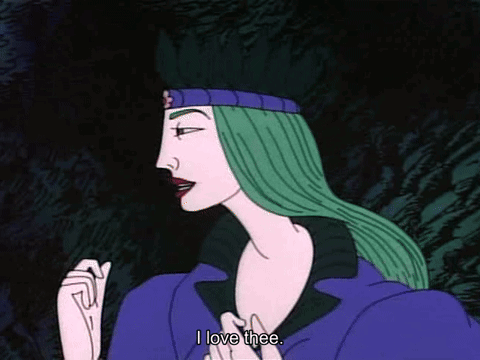
Later, Puck tells Oberon what has happened with Titania, and Oberon is delighted of course. But then two of the humans enter - it's Demetrius and Hermia, Hermia accusing Demetrius of murdering Lysander, as she couldn't find him when she woke. Oberon recognises Demetrius as the Athenian man he saw, but Puck only recognises Hermia, and now it's clear to both of them that there has been a mistake - Oberon starts yelling at poor Puck, whose appearance and voice in this portrayal really make him sympathetic in this scene! Oberon tells Puck to go and find Helena, and Puck flies away again, "swifter than arrow from the Tartar's bow" in his words, which will become relevant in a moment. A "Tartar" is an old term for someone from a vague region in central Asia - European knowledge of the area was limited.
Demetrius has sat down to sleep, so Oberon puts the love juice in his eye in readiness. Then Puck returns - in the form of an arrow, which turns back into him! The line about the arrow was there in the original play, but the idea of him transforming into one, of course, was not. So this is a creative interpretation of the scene!
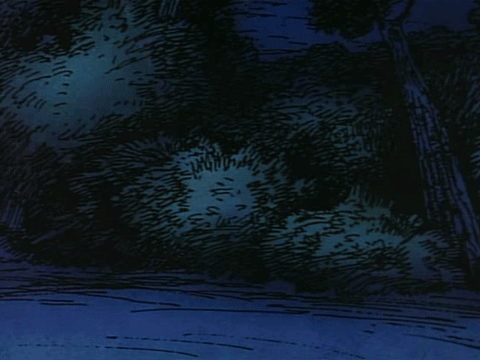
Puck has returned to say that Helena is coming, and Puck and Oberon blend into the background again as the next layer of the chaos unfolds - Demetrius awakes, falling in love with Helena, just as Lysander approaches, still in pursuit of her. The two have become love rivals again, but now over a different woman! Helena is now convinced that the two of them are doing this to make fun of her, and it's not hard to see why. Then Hermia enters the scene, sees Lysander with Helena, and shouts out one of the best Shakespearean insults:
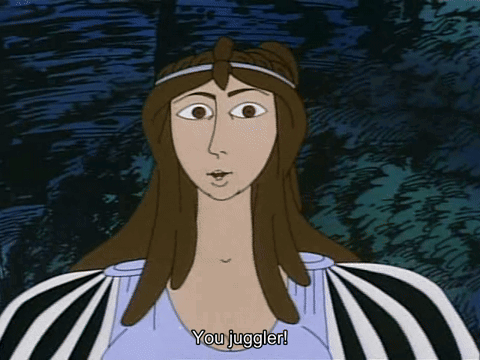
Hermia: You juggler!
It's Helena that she's addressing, so I guess the sense is that she has multiple men around her? The internet does inform me that "juggler" could also mean a conjurer in times past, though, so maybe Hermia is accusing Helena of casting a spell on Lysander - in which case, she's blaming the wrong person!
The two women start slinging insults at each other. At one point, Helena calls Hermia a "puppet" and Hermia calls Helena a "painted maypole", both referencing each other's height, which must be why this cartoon's version of Helena is taller even than Lysander. In a very weird artistic choice, most of the argument is depicted with the camera focusing on the feet of the four humans, cutting back and forth between them as they speak. Puck laughs about "what fools these mortals be" until Oberon yells at him again for causing all this trouble.
Lysander and Demetrius are just about to try and fight to the death over Helena, until the fairies step in. Puck casts a spell to bring darkness over the four Athenians and put them all to sleep, and then squeezes another petal's juice into Lysander's eye - he will see Hermia when he wakes, and then everyone will be happy with who they're paired up with! Please ignore the fact that this leaves Demetrius only in a happy relationship because magic has forced him to be that way. For the sake of a happy ending.
But it's not all over yet! Titania is of course still in love with the ass called Bottom - she offers him any food he could want, and he asks for dry oats. Because, you know. But then he says he needs to sleep, and Titania, after admiring him a little longer and stroking one of his donkey ears, also drifts off.
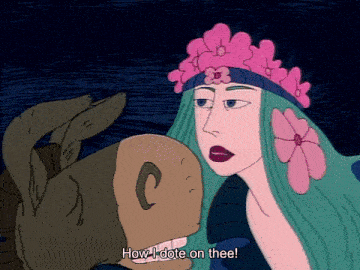
Oberon and Puck show up, and Oberon orders Puck to fly off with the changeling that the whole argument was about in the first place. It's worth noting that the boy doesn't actually appear in the original play, and all the plot involving him is delivered in conversation by the other characters - when shortening the play like this, it makes a lot of sense to just show the actions concerning him, to save time. Then Oberon swoops down to Titania, and there's a funny little animation effect where the stars that decorate his cape stay in the air when he moves away, and then come down to join him separately.
He puts the petal juice in her eye, and she wakes to see him, falling back in love with her husband in the second unethical resolution of the story, and is horrified to realise what kind of being she was sleeping next to. Then all the fairies fly off. Is Titania not going to question why Oberon has the changeling now? No, because the changes in handling his story have actually erased the reason why Oberon now has the right to him. You win some, you lose some.
Remember how this whole thing was meant to be leading up to the wedding of Duke Theseus and Hippolyta? The compression of the plot has actually removed those two up until now, so this is the first we see of them. They're out on an early morning hunt to celebrate their impending marriage, and they encounter the two sleeping couples, who wake. It doesn't explicitly show Lysander waking to see Hermia's face first, but we can clearly just assume it. Egeus is also in the hunting party, and tries to get the Duke to bring the law down on Lysander and Hermia, but the Duke is happy with the two couples as they are and overrides Egeus's will, even saying both couples can get married alongside himself and his bride. And he can do that because he's the Duke, got it?
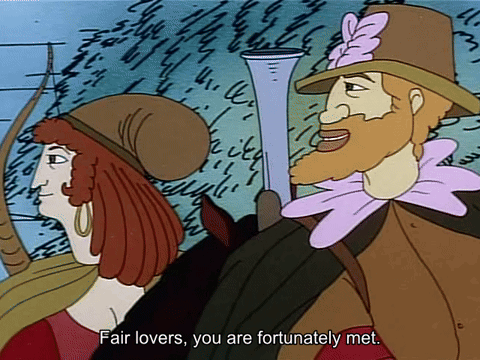
Demetrius wonders if they've really woken up, since everything still feels like a dream. Oh, perhaps it's the kind of dream that you have on a midsummer night or something like that. And Bottom's curse wears off without much being made of it, in time for us to move on to the Pyramus and Thisbe play.
All three couples watch as the actors make a terrible job of it: Quince overly explaining what each person is meant to be as if to show us that the narration in this show could have been a lot worse, the lion's roar scaring Flute's Thisbe so much that he runs off and knocks over the moon, and the suicide of Pyramus (Bottom poking a wooden sword between his torso and arm repeatedly) causing nothing but laughter in the crowd.
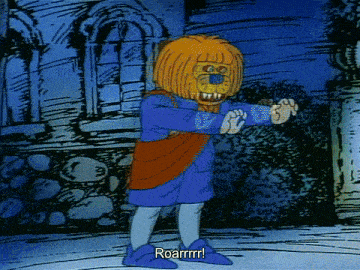
Then later, after dark, the fairies take over the same stage the actors had used to have their own song and dance. They are all given a new gold colour scheme for this scene, which I find a lot less interesting than their appearance in the rest of the show, since it doesn't vary at all.
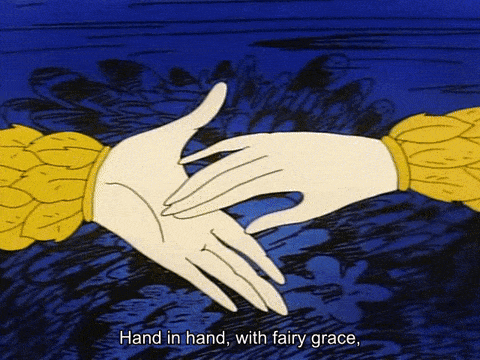
But in all, this was a good one. Love the character designs and voices, and they did what they had to do in terms of getting across the whole story. The animation was a bit low budget but I've seen worse. And that Puck! He's unforgettable!

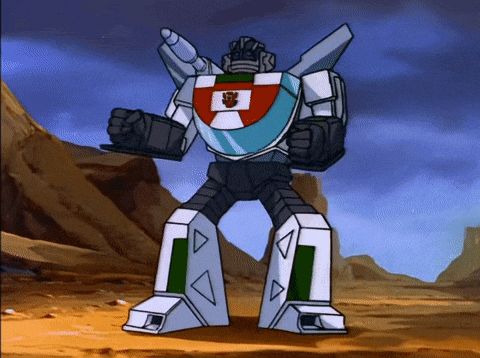
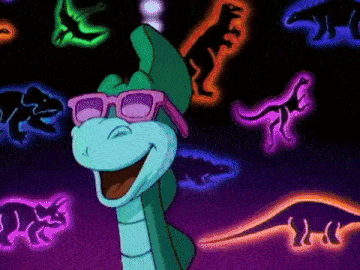
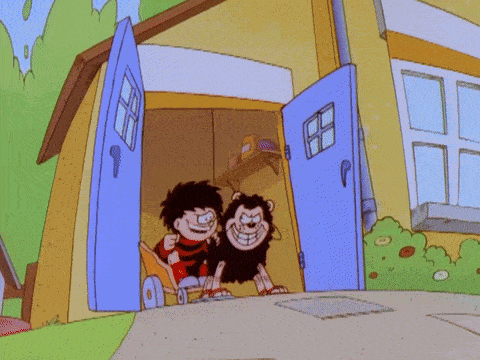
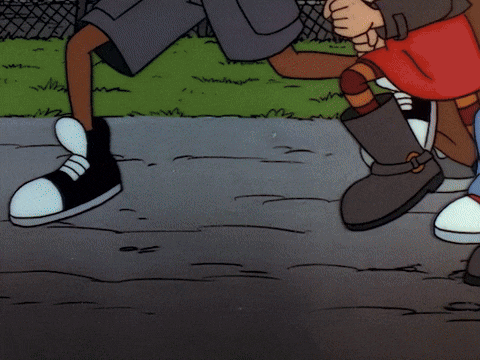
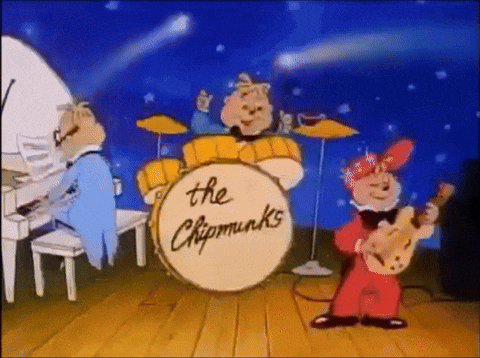
 Subscribe!
Subscribe!